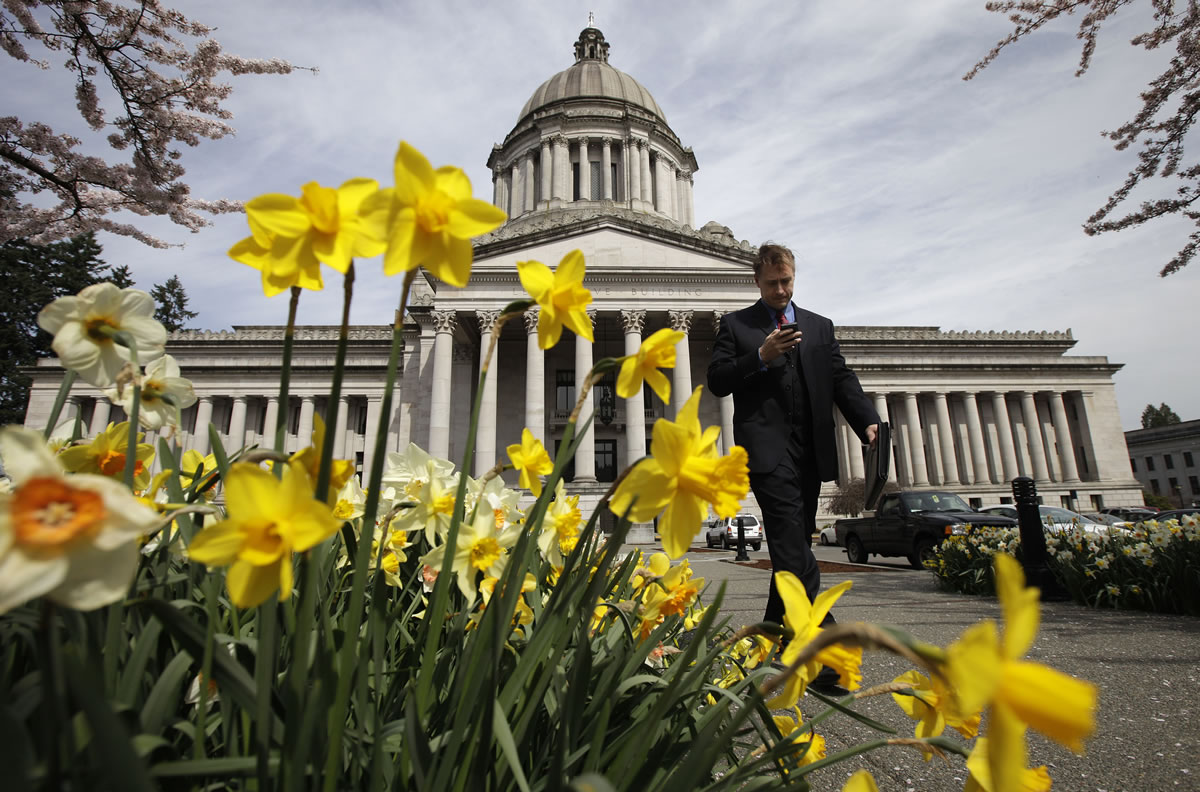OLYMPIA — At the end of February, the restaurant Anthony’s Homeport on the Olympia waterfront saw a table for five that racked up a total bill of $343.88.
If the tab had been split evenly, Democratic Sen. Steve Hobbs and Democratic Rep. Dean Takko each would have had a dinner portion exceeding $67, an amount that would have forced an extra layer of reporting. But when Boeing lobbyist Susan Champlain reported the expenditure on her disclosure filing, she wrote that the lawmaker portions of the bill were just over $45 apiece — a little under the $50 reporting threshold.
Champlain listed herself and another Boeing lobbyist as having a total portion of $207.84. A Boeing spokeswoman said in a statement that the company’s representatives arrived at the restaurant earlier than the elected officials, ordered beverages and appetizers while waiting, and covered the tip and taxes at the end of the meal.
“The amounts listed for each legislator accurately reflect the cost of legislator meals alone as neither official consumed pre-dinner food and beverages,” said Boeing spokeswoman Sue Bradley.
That filing is just one of many peculiar reports that appear to have become commonplace among Washington state lobbyists, who face almost no scrutiny for the bewildering records they file with the state’s Public Disclosure Commission.
The PDC, considered the state’s disclosure watchdog, hasn’t audited lobbyist filings in nearly a decade, not even doing spot checks to see whether lobbyists are reporting correctly. The Associated Press found cases in which lobbyists failed to properly complete basic forms, failed to disclose details of their expenses or regularly filed reports past their deadlines. Some lobbyists indicated they didn’t know the rules until reporters started asking questions.
For years, lobbyists have been required under law to specifically itemize the actual amounts that lawmakers receive in meals. Still, many lobbyists simply report overall meal totals.
Lori Anderson, a spokeswoman for the PDC, said the agency doesn’t have the staff or resources to monitor whether lobbyists are properly reporting their information, in part because lawmakers have cut funding for the commission. She said the agency instead focuses on just making sure lobbyists are actually filing reports.
Anderson also acknowledged that the agency’s forms probably need to be changed in order to make the rules clearer. She also said state law could be changed to make records more manageable, since a member of the public would need to spend many days going through thousands of pages in order to find how often a specific lawmaker gets a free meal or other entertainment benefit from lobbyists.
“You really have to want to find the information, and it takes a lot of time and effort,” Anderson said.
Rep. Jim Moeller, D-Vancouver, wants to make that information more accessible. He has proposed a measure that would require lobbyists to file their reports electronically, which would make them searchable and sortable. Lobbyists and other entities would have to pay an annual fee — $200 for lobbyists — to help fund the PDC.
“The public deserves to have a window into where that money goes — who’s taking whom out and who’s entertaining whom?” Moeller said.
Moeller said many lobbyists are working against the bill. Bob Cooper, a contract lobbyist, testified against the measure earlier this year, saying that while he supports computer filing and disclosure, he opposes the fee-based system. He said it was the equivalent of taxing the right to petition government.
“To put a fee on the ability to do that just strikes me as the wrong way to finance the system,” Cooper said during a hearing on the bill earlier this year. The measure got out of committee but hasn’t moved any further.
At the most basic level, lobbyists are supposed to provide details on who they represent, how much they get compensated and how they spend money to influence the Legislature. When it comes to entertaining lawmakers with meals, the lobbyists are tasked with reporting any meal exceeding $25, with a specific accounting of each person’s portion. For any meal over $50, the lobbyist is supposed to send a notification to the public official, who then must report the benefit on the personal financial disclosure forms once a year.
Some lobbyists and lawmakers freely talk about trying to keep meals under $50, but some appear to take creative approaches to make sure that happens.
Other times, major meals haven’t been reported on the lawmaker’s financial disclosure. In February of last year, for example, Democratic Sens. Nick Harper of Everett and Christine Rolfes of Bainbridge Island were guests of a four-person dinner that totaled $285.94. Michael Temple, a lobbyist for the trial lawyers’ group Washington State Association for Justice, reported covering the dinner.
PDC records filed by Temple do not itemize the meals, but an even split of the bill would have meant the lawmaker shares would have been over $71. It didn’t appear on the lawmaker financial disclosure forms as a gift over $50, and Harper said he didn’t receive notification about it. Temple said he made a mistake in failing to provide notification to the lawmakers that the meal was over $50 and was working to correct the error.
Temple, however, is among the lobbyists who testified in favor of Moeller’s bill. He said during a committee hearing earlier this year that it is difficult for lobbyists to file in the current PDC system and that a more modern electronic system would make it more useable for both lobbyists and the public.
“It makes tremendous amount of sense in the spirit of why the Public Disclosure Commission was created,” Temple said.



